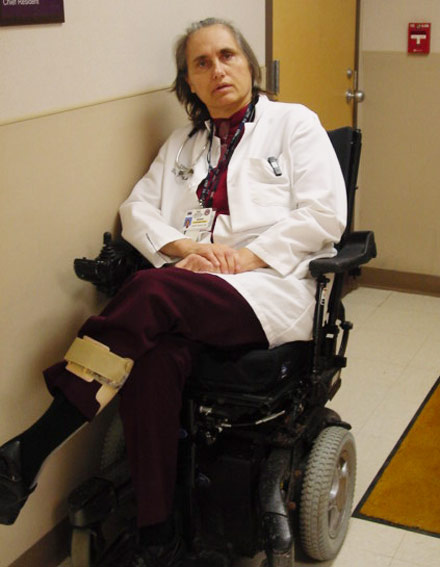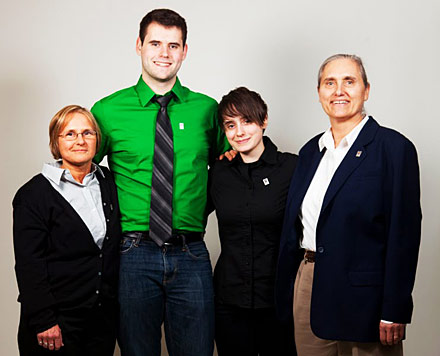
When Terry Wahls, M.D., stepped up to the lectern in a large meeting room at Iowa City Public Library recently to tell her story to a crowd of 100+, it was one of the smaller gatherings she will speak at this year. Hers is a kind of miracle tale, of a physician stricken with multiple sclerosis, bedridden and wheelchair bound, who dreamed of finding a non-drug intervention that could slow or halt the disease’s progression. Her efforts led her to develop the extraordinary Wahls Protocol, a radical diet plan that actually reversed her MS symptoms. Wahls’ triumph may fundamentally change the way chronic autoimmune illnesses are treated.
Dr. Wahls gained international attention after a 17-minute TEDx talk she gave in November 2011, which has been viewed by 1.6 million people. Her recently published book, The Wahls Protocol: How I Beat Progressive MS Using Paleo Principles and Functional Medicine, is an Amazon Top 250 bestseller that reached number one in several health-related categories. Her lecture schedule is booked for the rest of the year, and she regularly turns down international speaking opportunities so that she can manage ongoing clinical research and stay close to patients and family.
The way things are shaping up, Terry Wahls is poised to become a true phenomenon.
This is Your Brain on Antinutrients
Wahls was first diagnosed with multiple sclerosis in 2000, after years of serious health struggles. “I had total fatigue disability,” she told me by phone from her office at the Iowa City VA Health Care center, where she is assistant chief of staff. She is also a clinical professor of medicine at the University of Iowa.

“The muscles in my back and stomach were so weak I had to use a motorized tilt-recline wheelchair to get around,” she said. “I needed two canes to walk. I stumbled.” A former national Taekwondo champion, Wahls was barely mobile.
Today, she suffers virtually no MS-related symptoms. “A physical therapist looking at me would have a hard time finding an abnormality,” she said.
The path to the protocol began when she started investigating the relationship of nutrition to brain health. She pored over scientific studies and scoured online resources. She relearned biochemistry, cellular physiology, and neuroimmunology, finding that the brain of an MS sufferer literally shrinks due to malnutrition (as with Huntington’s, Parkinson’s, and Alzheimer’s). The problem is in the mitochondria, the cell’s tiny fuel-processing plants that convert the energy in food to a form that cells can utilize. Mitochondria are critical for anyone with a brain-related illness such as multiple sclerosis.
Wahls realized she could get all the nutrients the mitochondria needed from food. The key was choosing exactly the right foods and ingesting them in the ideal amounts. She got to work “figuring it all out,” she said, “which is where the magic began.”
She made exhaustive lists of all the vitamins and nutrients that feed the brain and the foods that provide them. She borrowed heavily from the work of Dr. Loren Cordain, creator of the nutrient-rich “Paleolithic” or hunter-gatherer diet. And she found useful insights in functional medicine, an integrative, holistic model that looks beyond just symptoms in treating chronic conditions and autoimmune illnesses.
In 2007, she created the Wahls diet, a food plan architected to provide exactly the micronutrients a depleted brain requires. And, importantly, she defined the toxic antinutrients that undid the work of these beneficial foods.

After beginning on the diet, amazing things started to happen. “I began to heal,” she says. In three months, she was able to walk with just one cane. A month later she was striding the VA hospital hallways on rounds without either cane. At five months she pedaled her bicycle around the block. Nine months in, she cycled 18 miles. The following year she took trail rides in the Canadian Rockies.
Not exactly the typical multiple sclerosis experience.
A Diet with Prehistoric Roots (and Other Vegetables)
So, what is this miracle diet? And can it help people with milder illness and discomfort?
Simply put, the Wahls Protocol is a structured Paleolithic diet, similar to what some experts believe our ancestors ate 20,000 years ago, comprised of vegetables, berries, nuts, organic meat, and wild fish—period. It eliminates all processed foods, dairy, sugar, gluten, and soy.
There are three levels of the diet, from easiest to most restrictive. The cornerstone of each is vegetables, and lots of ’em. Wahls firmly recommends nine cups a day, in order to capture all the vitamins, minerals, and antioxidants required to heal the body. The groups are divided equally into greens (lettuce, kale, etc.), “colors” (carrots, berries, etc.), and “sulfurs” (cabbage, broccoli, etc.). At the more extreme Paleo levels, you’ll be eating nutrient-rich organ meats such as liver and heart, along with seaweed and other atypical foods that may test one’s mettle. (Wahls had to leave her vegetarianism behind for the diet.) The protocol may also include lifestyle changes such as stress reduction, yoga, and electromuscular stimulation.
Based on the clinical trials, now in their second year, the “Wahls Warriors” have seen profound biochemical restoration and healing, which happens even in non MS-patients (such as people trying to lose weight, control blood sugar or cholesterol, or prevent heart disease). It also helps reduce mental and neurological problems, said Wahls, who claims that people can see changes in as little as two weeks, and increased energy in 1-3 months.
The Wahls Protocol, however, can be challenging, expensive, and restrictive. It is not for the hurried or harried, since you will be spending lots of time shopping and preparing meals. Take heart, though. If you suffer from a milder autoimmune disorder or food allergy, you may simply have to eliminate allergy- or inflammation-inducing substances like sugar, gluten, and dairy.
If you do choose to undertake the Wahls Protocol, described exhaustively in the book, help is on the way. Plans are currently in the works for Wahls frozen meals and a 30-day Wahls residential retreat. Recipes are at www.terrywahls.com, along with supportive stories.
Losing Weight, Feeling Better
Wahls has been riding a tidal wave of momentum, and much has broken her way—except for the endorsement of the traditional medical community. Wahls’ hope is that the scientific validation coming out of her research can change this.
“Our clinical trials show that we’re having a very large impact on fatigue, a 40-percent reduction,” she said. “The most serious side effect? If you’re overweight, you lose weight without being hungry and get back to your ideal body weight.”
The clinical trials employ the same interventions Wahls used in the first year of her recovery. The 20-person study’s first year concluded in December 2013. Wahls plans to publish several papers showing changes in balance, walking, mood, thinking ability, and quality of life. Her first paper was published in January 2014 in the Journal of Alternative and Complementary Medicine.
Blips on the Radar Screen
At this early stage of the revolution, Wahls’s work is still just a blip on the radar screens of the multi-trillion-dollar pharmaceutical industry. But if Terry Wahls is right, and drugs may not be needed in treating MS and other complex chronic diseases, the corporate Goliath will almost certainly take note.
To advance the cause and prepare for that day, Wahls and her team are ever in search of angel donors to support her research, operations, and outreach. Until then, Dr. Wahls will grab every opportunity to tell her story.
“If I can come back from MS,” she said, “then people with serious obesity, diabetes, inflammatory bowel disease, rheumatoid arthritis, psoriasis, eczema, PTSD, and depression can be helped, too. When we get them into diet and lifestyle, their symptoms decline and even reverse.”
In her TEDx video she warns about the dangers of SAD (the Standard American Diet of processed foods) which she sees as the root cause of much chronic and autoimmune illness: “I am the canary in the coal mine. I’m a warning.”
If her work can help change the practice of medical science, then the price may well have been worth it, she says.
“Getting MS was a profound gift,” she told me as we wound down our call so she could prepare for her next patient. “I’ve changed the conversation about the role of diet in all sorts of disease. It’s my gift to the world to tell people to consider the possibility that you too can reclaim your life.”
A Trailblazer at Heart
Dr. Terry Wahls herself may be the best proof of the success of her protocol. At 58, she radiates health and vitality. Sporting smartly clipped short gray hair and a sharp sense of style, she marries no-nonsense with congenial, a physician-scientist with an encyclopedic grasp of biochemistry and the confidence to defend her positions. Wahls speaks readily of her children, her wife Jackie (a nurse practitioner, also at the VA hospital), and her personal history, in an honest, salt-of-the-earth way that derives from a childhood spent riding horses and chasing chickens around an Iowa farm. Wahls earned a BFA in studio art before attending IU’s medical school. Other than a short stint in Wisconsin, she and her family have always lived in Iowa.

Wahls is the mother of a son and a daughter who are true biological siblings (they share the same male donor DNA). The trailblazer gene seems to be very much in the family. A YouTube video of son Zach’s impassioned testimony in defense of gay marriage at a 2011 Iowa House Judiciary Committee hearing is currently at 2.6 million views, a cool million ahead of his mother’s own viral video. A Truman Scholar, Zach will head to Washington, D.C., for an internship later this spring. Wahls’ college-age daughter, Zebby, aspires to work for the FBI as a fraud detective.
Has being a gay female physician presented obstacles for Wahls? “Not at all,” she said. “I’ve always been straightforward about who I am. If you’re comfortable with who you are, the public will be, too.”
Contact writer:
info@warrengoldie.com
www.WarrenGoldie.com
